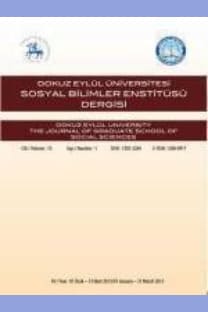KÜÇÜK VE ORTA BÜYÜKLÜKTEKİ İMALAT İŞLETMELERİNDE SÜRDÜRÜLEBİLİR ÜRETİM DÜZEYİNİN BELİRLENMESİ: MARDİN ORGANİZE SANAYİ BÖLGESİ ÖRNEĞİ
Sürdürülebilirlik, Sürdürülebilir Üretim, Küçük ve Orta Büyüklükteki İşletmeler, Mardin Organize Sanayi Bölgesi.
DETERMINING SUSTAINABLE PRODUCTION LEVEL IN SMALL AND MEDIUM-SIZED MANUFACTURING ENTERPRISES: CASE OF MARDIN ORGANIZED INDUSTRIAL ZONE
Sustainability, Sustainable Production, Small and Medium-sized Enterprises, Mardin Organized Industrial Zone.,
___
- Abubakari, M., Asamoah, P. K. B., & Agyemang, F. O. (2018). Ghana and sustainable development: The 40-year national development plan in retrospective. Journal of Human Resource and Sustainability Studies, 6 (01), 24–36. https://doi.org/10.4236/jhrss.2018.61024
- Akkoyun, A. Y. (2016). Sürdürülebilir üretimi engelleyen faktörlerin bulanık KFY yöntemi ile analizi (Yayınlanmamış Yüksek Lisans Tezi). Yıldız Teknik Üniversitesi, Fen Bilimleri Enstitüsü, İstanbul.
- Alayon, C., Safsten, C. & Johansson, G. (2017). Conceptual sustainable production principles in practice: Do they reflect what companies do? Journal of Cleaner Production, 141, 693-701.
- Alves, W., Ferreira, P., & Araújo, M. (2018). Sustainability awareness in Brazilian mining corporations: The case of Paraíba state. Environment, Development and Sustainability, 20 (1), 41-63.
- Aracıoğlu, B. (2010). Üretim/İşlemler yönetimi alanında yaşanan paradigmal değişimler kapsamında sürdürülebilir üretim, Ege Akademik Bakış, 10 (1) 2010, 141-156.
- Arslan, F. (2018). Türkiye’de sürdürülebilir üretimde organize sanayi bölgelerinin rolü: Manisa Organize Sanayi Bölgesi (MOSB) örneği, Marmara Coğrafya Dergisi. 37, 167-182.
- Atak, Ş., & Fidan, E. T. (2014). Bütüncül ve önleyici bir çevre yönetimi yaklaşımı olarak temiz üretim yaklaşımı ve Türkiye’de uygulanması. Finans Politik ve Ekonomik Yorumlar, 51(596), 59-69.
- Baydas, Ö. & Cicek, M. (2019). The examination of the gamification process in undergraduate education: a scale development study. Technology, Pedagogy and Education. 28 (3), p: 269-285. https://doi.org/10.1080/1475939X.2019.1580609.
- Bin, J. M., Diangha, S. N. & Ofeh, M. A. (2021). Impact of access to credit on the sustainability of small and medium sized enterprises in cameroon. American journal of ındustrial and business management, 11 (6), 705-718. https://doi.org/10.4236/ajibm.2021.116046
- Cravo, R., & Guerreiro, J. (2019). Environmental sustainability: A 30-year progress assessment in portugal. Journal of Environmental Protection, 10 (11), 1507–1535. https://doi.org/10.4236/jep.2019.1011090
- Çoban Kumbalı, H., İncekara, M. & Sarıkaya, M. (2022). KOBİ’lerde çevresel ve sosyal sürdürülebilirlik: Avrupa Birliği ülkeleri ve Türkiye karşılaştırması. Kafkas Üniversitesi İktisadi ve İdari Bilimler Fakültesi Dergisi, 13 (26), 789-823.
- Diesendorf, M. (2000). Sustainability and sustainable development. D. Dunphy, J. Benveniste, A. Griffts & P. Sutton (Der.). Sustainability: The corporate challenge of the 21st century içide, (ss. 19-37). Singapore: Markono Print Media.
- Erdin, C. & Ozkaya, G. (2020). Contribution of small and medium enterprises to economic development and quality of life in Turkey. Heliyon, 6 (2), 1-14. https://doi.org/10.1016/j.heliyon.2020.e03215.
- Hossain, M. I., San, O. T., Ling, S. M., & Said, R. M. (2020). The role of environmental awareness and green technological usage to foster sustainable green practices in Bangladeshi manufacturing SMEs. International Journal of Advanced Science and Technology, 29 (7), 3115-3124.
- İnşaat Malzemesi Sanayicileri Derneği (İMSAD) (2012). Sürdürülebilirlik Farkındalığı Değerlendirme Raporu. https://imsad.org/tr/Yayinlar/sektorel-raporlar/ (Erişim Tarihi: 02.03.2023).
- Karabulut, E. (2003). İşletmelerde çevre bilinci ve yeşil yönetim uygulamalarının işletme başarısına katkısını incelemeye yönelik bir araştırma (Yayınlanmamış Yüksek Lisans Tezi). İstanbul Üniversitesi, Sosyal Bilimler Enstitüsü, İstanbul.
- Kota, S., Mishra, R. P., Krishna Jasti, N. V., & Kale, S. (2021). Sustainable production system critical success factors: An interpretive structural modelling approach. Procedia, 98, 324–329. https://doi.org/10.1016/j.procir.2021.01.111
- Martínez, J. M. G., Puertas, R., Martín Martín, J. M., & Ribeiro-Soriano, D. (2022). Digitalization, innovation and environmental policies aimed at achieving sustainable production. Sustainable Production and Consumption, 32, 92–100. https://doi.org/10.1016/j.spc.2022.03.035
- Millar, H. H., & Russell, S. N. (2011). The adoption of sustainable manufacturing practices in the Caribbean. Business Strategy and the Environment, 20 (8), 512-526.
- O’Brien, C. (1999). Sustainable production a new paradigm for a new millennium. International Jornal Production Economics, 60 (61),1-7.
- Ömürbek, N., Tunca, M. Z., Mercan, Y., & Yetim, T. (2012). Deri sektöründe çevreye duyarlı üretim üzerine bir araştırma. Balkan Sosyal Bilimler Dergisi, 1 (2), 1-14.
- Ratnasingam, J., & Wagner, K. (2009). Green manufacturing practices among wooden furniture manufacturers in Malaysia. European Journal of Wood and Wood Products, 67(4), 485-486.
- Resmi Gazete, Sayı:31782 (2022). Küçük ve orta büyüklükteki işletmelerin tanımı, nitelikleri ve sınıflandırılması hakkında yönetmelikte değişiklik yapılmasına dair yönetmelik. https://www.resmigazete.gov.tr/ (Erişim Tarihi: 18.11.2022).
- Syaifullah, D. H., Tjahjono, B., McIlhatton, D. & Zagloel, T. Y. M. (2022). The impacts of safety on sustainable production performance in the chemical industry: A systematic review of literature and conceptual framework. Journal of Cleaner Production, 366, 1-15. https://doi.org/10.1016/j.jclepro.2022.132876
- Şenocak, B. (2017). İşletmelerde çevresel sürdürülebilirlik bilinci, denizli tekstil işletmelerine yönelik bir araştırma (Yayınlanmamış Yüksek Lisans Tezi). Pamukkale Üniversitesi, Sosyal Bilimler Enstitüsü, Denizli.
- TTGV (2010). Temiz (sürdürülebilir) üretim uygulamalarının yaygınlaştırılması için çerçeve koşulların ve ar-ge ihtiyacının belirlenmesi projesi sonuç raporu. https://www.ttgv.org.tr/ (Erişim Tarihi: 24.12.2022).
- Turhan, E., Kartum, G. & Özdemir, Y. (2018). Sürdürülebilir üretim ve işletme uygulamaları. Burdur Mehmet Akif Ersoy Üniversitesi Bucak İşletme Fakültesi Dergisi, 1 (1), 1-15.
- TURKOSB (2023). Mardin organize sanayi bölgesi. Erişim Adresi: http://turkosb.com/mardin-organize-sanayi-bölgesi.html (Erişim Tarihi: 06.05.2023).
- ISSN: 1302-3284
- Yayın Aralığı: 4
- Başlangıç: 1999
- Yayıncı: Dokuz Eylül Üniversitesi Sosyal Bilimler Enstitüsü
TÜRKİYE’DE ANARŞİST YAYINCILIĞIN BAŞLANGICI: KARA VE EFENDİSİZ DERGİLERİ
ARKEOLOJİDE MALZEME ANALİZİ VE SAHTE ESERLERİN BELİRLENMESİ
OSMANLI’DA BAŞLIĞIN YERİ: II. ABDÜLHAMİD VE II. MEŞRUTİYET DÖNEMLERİNDEKİ ŞAPKA YASAĞI UYGULAMALARI
REHBERLİK VE ARAŞTIRMA MERKEZLERİNİN İŞ YÜKÜ: DURUM ÇALIŞMASI
GÖÇ SÜRECİNDE KADINLIK VE ERKEKLİĞİN YENİDEN İNŞASI: SAHA ARAŞTIRMASINDAN NOTLAR
KİŞİLİK TİPLERİ İLE BİREYSEL GİRİŞİMCİLİK YÖNELİMİ İLİŞKİSİ ÜZERİNDE GİRİŞİMCİLİK EĞİTİMİNİN ETKİSİ
